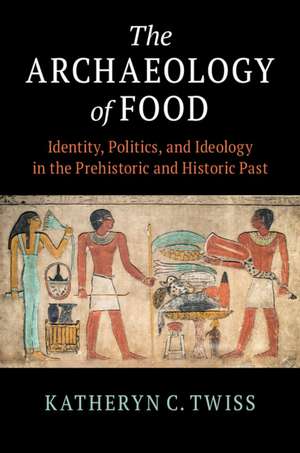The Archaeology of Food: Identity, Politics, and Ideology in the Prehistoric and Historic Past
Autor Katheryn C. Twissen Limba Engleză Hardback – 13 noi 2019
| Toate formatele și edițiile | Preț | Express |
|---|---|---|
| Paperback (1) | 200.19 lei 6-8 săpt. | |
| Cambridge University Press – 13 noi 2019 | 200.19 lei 6-8 săpt. | |
| Hardback (1) | 551.45 lei 38-44 zile | |
| Cambridge University Press – 13 noi 2019 | 551.45 lei 38-44 zile |
Preț: 551.45 lei
Preț vechi: 680.80 lei
-19% Nou
Puncte Express: 827
Preț estimativ în valută:
105.52€ • 110.57$ • 87.23£
105.52€ • 110.57$ • 87.23£
Carte tipărită la comandă
Livrare economică 08-14 aprilie
Preluare comenzi: 021 569.72.76
Specificații
ISBN-13: 9781108474290
ISBN-10: 1108474292
Pagini: 256
Ilustrații: 15 b/w illus.
Dimensiuni: 156 x 235 x 16 mm
Greutate: 0.5 kg
Editura: Cambridge University Press
Colecția Cambridge University Press
Locul publicării:New York, United States
ISBN-10: 1108474292
Pagini: 256
Ilustrații: 15 b/w illus.
Dimensiuni: 156 x 235 x 16 mm
Greutate: 0.5 kg
Editura: Cambridge University Press
Colecția Cambridge University Press
Locul publicării:New York, United States
Cuprins
1. What is food, and why do archaeologists study it?; 2. How do archaeologists study food? Data sets and methods; 3. Food and economics; 4. Food and inequality; 5. Food and politics; 6. Identity: food, affiliation, and distinction; 7. Food, ritual, and religion; 8. Archaeology, food, and the future.
Recenzii
'Engaging examples drawn from published research are provided throughout, supported by an extensive, up-to-date bibliography. Even though this text is written in a style that seems intended primarily for students, faculty and other researches are likely to find it useful as well.' W. Kotter, Choice
'The Archaeology of Food takes a global perspective on the centrality of food. In this short but exceptionally well-written volume, Twiss shows how food can be used to understand economic systems, social inequality, politics, religion, identity, and human–environment relationships in the past and present.' Matthew E. Hill Jr, American Anthropologist
'With its wide variety of case studies and outstanding bibliography, The Archaeology of Food should be on the bookshelves of researchers working on issues of cuisine, foodways, and zooarchaeology. Its modest length and exceptionally clear writing also make this volume a must-read in various undergraduate and graduate seminars. With her often witty prose, and a commitment to make even the most arcane academic debate understandable to beginning students, Twiss has produced an engaging book that will help both the student and professional alike better understand how archaeologists study food.' Matthew E. Hill, Jr, American Anthropologist
'The Archaeology of Food takes a global perspective on the centrality of food. In this short but exceptionally well-written volume, Twiss shows how food can be used to understand economic systems, social inequality, politics, religion, identity, and human–environment relationships in the past and present.' Matthew E. Hill Jr, American Anthropologist
'With its wide variety of case studies and outstanding bibliography, The Archaeology of Food should be on the bookshelves of researchers working on issues of cuisine, foodways, and zooarchaeology. Its modest length and exceptionally clear writing also make this volume a must-read in various undergraduate and graduate seminars. With her often witty prose, and a commitment to make even the most arcane academic debate understandable to beginning students, Twiss has produced an engaging book that will help both the student and professional alike better understand how archaeologists study food.' Matthew E. Hill, Jr, American Anthropologist
Notă biografică
Descriere
Surveys the archaeology of food: its methods and its themes (economics, politics, status, identity, gender, ethnicity, ritual, religion).
